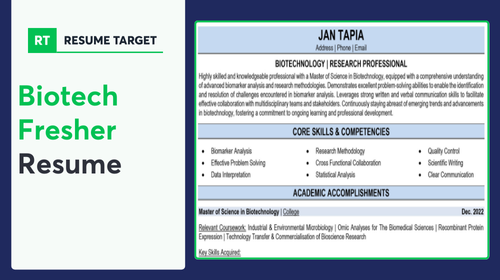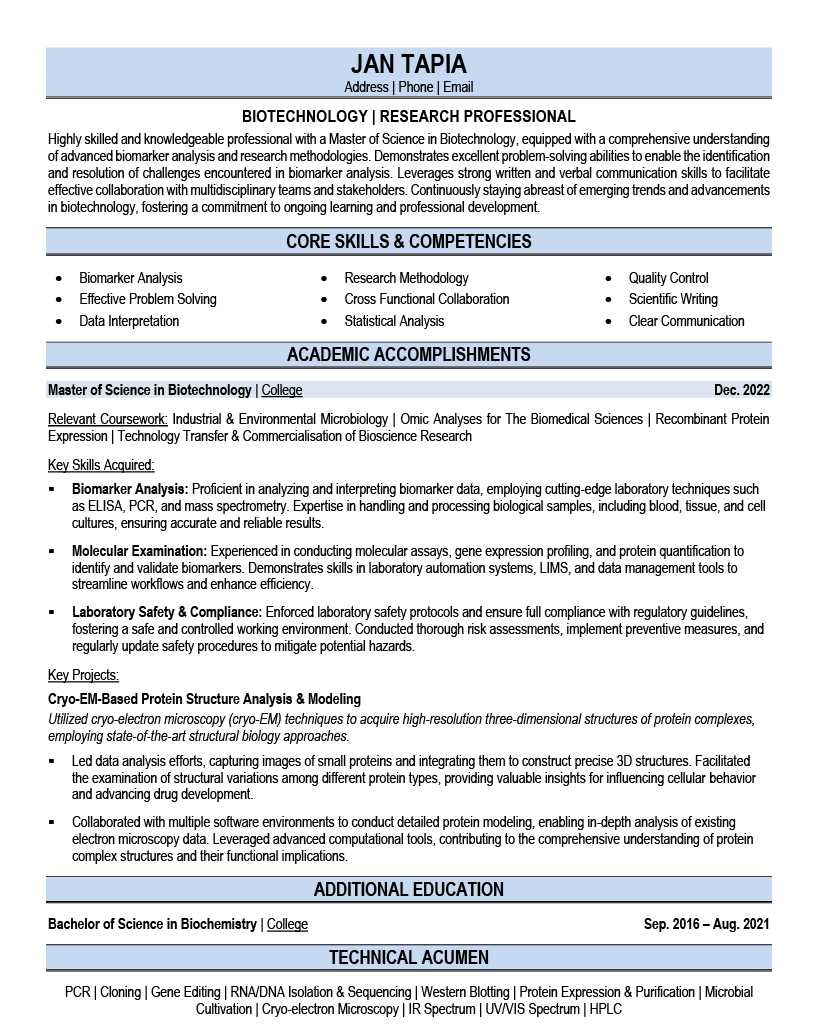

Breaking into biotech can feel like trying to crack a complex genetic code. The challenge isn't just your limited experience - it's knowing how to present your potential to employers who want proven talent.
Are you struggling to make your academic achievements and lab work translate into job-ready skills? Your resume needs to bridge the gap between your scientific knowledge and real-world applications, showing employers you're ready to contribute from day one.
Resume Target specializes in helping biotech freshers transform academic excellence into compelling professional stories. We'll help you showcase your research projects, technical skills, and analytical abilities in a way that catches the attention of hiring managers in the biotech industry.

As an entry-level professional in one of science's most innovative fields, you'll be part of an industry that's actively shaping the future of healthcare, pharmaceuticals, and genetic research.
Your role combines hands-on laboratory work with data analysis, where you'll assist in conducting experiments, maintaining detailed records, and collaborating with experienced researchers while developing crucial technical and analytical skills that form the foundation of your biotech career.
Whether you're interested in drug development, genetic engineering, or biomanufacturing, your journey as a Biotech Fresher opens doors to numerous specializations and advancement opportunities in this rapidly expanding field, where continuous learning and innovation go hand in hand.
Let's talk about what's exciting in the biotech industry right now - your earning potential as a fresher is looking incredibly promising! The field offers multiple career paths with competitive compensation, and here's what's great: your advanced degree in biotechnology opens doors to roles ranging from research and development to medical science, with opportunities to significantly increase your earnings as you gain experience.
Figures from: Northeastern University Graduate Programs
Starting your biotech career opens doors to exciting scientific advancement opportunities. With projected growth of 5% through 2029, you can build a rewarding career path from lab work to leadership.
Beyond basic lab techniques, your success in biotech depends on mastering both technical expertise and essential soft skills that drive innovation and collaboration.
- Advanced laboratory techniques and procedures - Bioinformatics and data analysis - Research methodology and experimental design - Project management and leadership abilitiesLaunch your biotech career by targeting entry-level positions in research, manufacturing, or quality control while building a foundation of hands-on laboratory experience and technical expertise.
To succeed in biotech, you'll need to develop both technical and soft skills, with communication and teamwork being just as crucial as your understanding of biological principles.
Requirements from Greatness Bio
From coastal biotech hubs to emerging research corridors, entry-level biotech roles are thriving in key life sciences clusters.
Figures from CBRE 2023 U.S. Life Sciences Outlook
Just graduated with your biotechnology degree and feeling overwhelmed about creating your first professional resume that stands out in the competitive biotech industry? This comprehensive, section-by-section guide will show you exactly how to craft a compelling biotech fresher resume that highlights your academic achievements, laboratory skills, and research experience.
As a recent biotech graduate, crafting your first professional resume summary can feel as challenging as mastering complex laboratory protocols during your studies.
While you've gained valuable skills in molecular biology, genetic engineering, and research techniques, translating these fresh capabilities into a compelling summary that catches a hiring manager's attention requires a strategic approach that showcases your potential.
How would you describe your academic foundation in biotechnology and the specific areas of life sciences that most excite you professionally?
Reason: This helps establish your educational credibility while showing genuine passion for the field, which is crucial for freshers who may lack extensive work experience but can demonstrate strong theoretical knowledge and enthusiasm.
What combination of technical laboratory skills and modern biotech tools are you most comfortable with from your academic projects or internships?
Reason: Highlighting your hands-on capabilities with industry-relevant techniques and equipment shows practical readiness for entry-level positions, even without formal work experience.
How do you see yourself contributing to the evolving biotech industry, particularly in areas like research, product development, or quality control?
Reason: This helps frame your career vision and shows potential employers that you've thought about your role in the industry beyond just seeking a job, demonstrating professional maturity and long-term potential.
As a biotech fresher entering the industry, you'll need to effectively showcase both your academic knowledge and practical laboratory experience to stand out from other candidates.
Your skills section should balance fundamental biotechnology competencies like cell culture and PCR techniques with transferable skills such as data analysis and laboratory documentation, while highlighting any relevant internship or project experience.
Even with limited industry experience, you can create impact by organizing your internships, lab work, and research projects into three powerful sections: a concise role overview, measurable achievements from your academic projects, and relevant technical responsibilities that showcase your biotech capabilities.
Many entry-level biotech professionals struggle to demonstrate their value without extensive industry experience. Transform your academic projects, internships, and laboratory achievements into compelling proof of your potential by connecting them to key industry metrics and innovation goals.
The responsibilities section demonstrates your understanding of biotech fundamentals and laboratory procedures beyond basic tasks. It's crucial to explain technical work in clear terms while showing how your entry-level contributions support research goals and product development.
As a Biotech Fresher, your educational background and specialized certifications are crucial differentiators that demonstrate your technical foundation. Focus on highlighting your relevant biotechnology degree and any additional certifications in areas like GMP, lab techniques, or bioinformatics tools that show your commitment to the field.
Now that you've created a strong foundation using Resume Target's comprehensive resume writing guidelines, you're ready to transform your resume into a powerful tool for landing your first biotech position.
While many new graduates make the mistake of using the same resume for every application, customizing your resume for each biotech role is crucial for standing out in this competitive field.
A tailored biotech resume not only helps you clear sophisticated ATS systems by incorporating the right keywords, but also demonstrates to hiring managers that your academic projects, internships, and laboratory skills align perfectly with their specific research needs and company culture.
Ready to turn your resume into your secret weapon? Let's make every application count by showcasing exactly why you're the perfect candidate for each biotech position!
Don't let a lack of work experience hold you back from launching your biotech career! Your fresh perspective and strong educational foundation can be powerful assets in the rapidly evolving biotechnology field.
Instead of dwelling on limited work history, showcase your laboratory techniques, research projects, and relevant coursework to demonstrate your readiness for the role.
Focus on highlighting your technical skills, academic achievements, and any research or internship experiences that align with your target position.
For more guidance on structuring your resume, check out the Student Resume Writing Guide to ensure you're presenting your qualifications in the best possible light.
Your resume summary is your chance to showcase your fresh perspective, cutting-edge education, and hands-on laboratory experience from your academic projects and internships.
Focus on highlighting your relevant technical skills, research experience, and passionate commitment to biotechnology innovation rather than dwelling on your entry-level status.
"Detail-oriented and research-driven Biotechnology graduate with comprehensive laboratory experience gained through university projects and internships. Proficient in cell culture techniques, PCR analysis, and protein purification methods, with demonstrated success in conducting independent research projects. Completed specialized coursework in genomics and bioinformatics, maintaining a 3.8 GPA while contributing to two published research papers. Seeking to leverage strong analytical skills and passion for biotechnology innovation in an entry-level research position."
Now's your chance to showcase the valuable scientific knowledge and laboratory skills you've gained through your biotechnology coursework and academic projects!
Don't just list your degree - highlight relevant courses like Molecular Biology and Cell Culture Techniques, plus describe key research projects where you applied biotech concepts, like that protein expression study or bacterial transformation experiment you mastered in lab.
Common courses for a Biotechnology degree/certification include: - BIO 100 - First Year Seminar [1] - BIO 105 - Cell Structure and Function [1] - BIO 106 - Genetics and Development [1] - BIO 107 - Organismal Form [1] - Biology, chemistry, physics, and as much math as you can in high school [2] - process technology, microbiology, and (bio-)organic chemistry [3]Relevant Coursework: Cell Structure and Function | Genetics and Development | Organismal Form | Process Technology | Microbiology | Bio-organic Chemistry
Key Projects:
Recombinant Protein Expression Analysis: Optimized protein expression protocols in E. coli to improve yield and purity of target therapeutic proteins while reducing production time and costs.
Microbial Fermentation Process Development: Collaborated with a team of four to design and optimize fermentation conditions for producing biopharmaceutical compounds.
Transform your academic achievements and laboratory experience into compelling professional qualifications by highlighting the technical skills, research methods, and analytical capabilities you've developed through your coursework, internships, and practical training.
As a Biotech Fresher, your combination of foundational laboratory skills and current scientific knowledge positions you perfectly for roles in research facilities, pharmaceutical companies, or biotechnology startups, where the industry's rapid growth creates exciting opportunities for newcomers.
Breaking into biotech can feel overwhelming when you're staring at a blank resume, trying to prove your potential without years of industry experience to back it up.
At Resume Target, we specialize in crafting entry-level biotech resumes that showcase your academic achievements, research projects, and transferable skills in ways that catch recruiters' attention.
Our proven approach has helped countless biotech graduates land their first industry roles by highlighting their theoretical knowledge and hands-on lab experience in ways that resonate with hiring managers.
With biotech companies actively recruiting fresh talent for their expanding teams, now is the perfect time to transform your academic credentials into a job-winning resume - let's get started with a free consultation today!
Impress any hiring manager with our Biotechnology resume writing service. We work with all career levels and types of Biotechnology professionals.
Learn More → Biotechnology Resume Writing Services